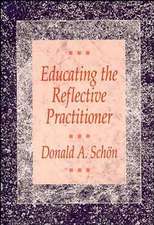Bourdieu for Educators: Policy and Practice
Autor Fenwick W. English, Cheryl L. Boltonen Limba Engleză Paperback – 18 feb 2015
Bourdieu for Educators: Policy and Practice brings the revolutionary research and thinking of Pierre Bourdieu (1930-2002) of France to public educational leaders in North America, Canada, and the U.K. This text brings Bourdieu’s work into the arena of elementary and secondary educational reform and change, and offers policy, research, and practice discussions. Authors Fenwick W. English and Cheryl L. Bolton use Bourdieu to challenge the standards movement in different countries, the current vision of effective management, and the open-market notion connecting pay to performance. The text shows that connecting pay to performance won’t improve education for the poorest group of school students in the U.S., Canada, or the U.K., regardless of how much money is spent trying to erase the achievement gap. The authors lay out the bold educational agenda of Pierre Bourdieu by demonstrating that educational preparation must take into account larger socio-economic-political realities in order for educational change and reform to make an impact.
Preț: 465.49 lei
Nou
Puncte Express: 698
Preț estimativ în valută:
89.07€ • 97.14$ • 75.11£
89.07€ • 97.14$ • 75.11£
Carte tipărită la comandă
Livrare economică 24 aprilie-08 mai
Preluare comenzi: 021 569.72.76
Specificații
ISBN-13: 9781412996594
ISBN-10: 1412996597
Pagini: 144
Ilustrații: illustrations
Dimensiuni: 152 x 229 x 16 mm
Greutate: 0.2 kg
Ediția:1
Editura: SAGE Publications
Colecția Sage Publications, Inc
Locul publicării:Thousand Oaks, United States
ISBN-10: 1412996597
Pagini: 144
Ilustrații: illustrations
Dimensiuni: 152 x 229 x 16 mm
Greutate: 0.2 kg
Ediția:1
Editura: SAGE Publications
Colecția Sage Publications, Inc
Locul publicării:Thousand Oaks, United States
Recenzii
The book is excellent. Dr. English and Cheryl L. Bolton do a masterful job in explaining how educational leadership is actually under attack by outside forces. The landscape has changed significantly due to political forces disguised by accreditation initiatives. [...] Bourdieu for Educators with the application of Dr. English's ideas and insights is absolutely essential reading and adoption for those wanting to rescue the field of educational leadership and administration from the "Billionnaires Boys Club" and many other destructive factions.
Cuprins
Chapter 1: Introducing Pierre Bourdieu to Educational Practitioners
Bourdieu’s Biography
Vielseitigkeit: What is Distinctive About Bourdieu
Understanding the Nature of Pedagogic Work as Political Struggle
The “Culture Wars” in the U.S. and the U.K.: Similarities and Differences
The Battle Over the Correct Academic Subjects and Proper Pedagogic Work
The Concept of Misrecognition and How It Works
Some History with Misrecognition in the Past
Building Awareness of the Forces at Play
Without New Eyes: The Blinders of Doxa as Orthodoxy
Bourdieu as the Public Intellectual, Activist and Provocateur
Chapter 2: Unmasking the School Asymmetry and the Social System
Bourdieusian Cornerstones
Bourdieu’s Concept of Habitus
An Example of Neighborhood Habitus
A Case Study of How Family Habitus Works to Shape Career Aspirations
The Intersection of Class, Social Space and the Field
An Example of a Field with Its Own Logic
The Cultural Arbitrary
The Plight of Minority Children Facing the Dominant Cultural Arbitrary in Schools
How the System Works as a Game
Who Benefits from Schools as They Are?
Illuiso and Unquestioned Loyalty to Continuing Orthodoxies
The Bounded Nature of Choice Within a Designated Social Space
Educational Inequalities Must Remain Unnamed
Connecting the Dots: The Importance of Family in School Success
The Challenge of Reducing Social Inequality as an Educational Goal
Chapter 3: The Curriculum, Qualifications and Life Chances
The Three Forms of Capital
Empirical Validation of the Impact of Social Capital on School Success
The Power of Cultural Capital and Bourdieu’s Own Experience as a Student
Schools as Institutionalized Embodiments of Forms of Cultural Capital
Capital, Power, Symbolic Violence, and Scholastic Habitus
Two Recent Examples of Symbolic Power (Violence) with School Curricula
Social Origin and School Success: Historical and Continuing Evidence of the Linkage Between Them
Academic Failure as the “Fault” of the Student?
Academic Credentials—Essential Capital?
The Hidden Curriculum, Cultural Values and Schooling Success
Calculating Life Chances: The Academic vs. Vocational Education Debate
The Issue of the Mal-Distribution of Opportunity
Chapter 4: The Shifting Control of Leadership Preparation
The Construction of National Leadership Standards in the U.K. and the U.S.
The Major Epistemological Steps Behind National Standards
Core Technologies and the Reification of the Status Quo
The Shifting Nature of the Contestation and Changer in Power in the Education Field
The De-Contextualization of School Leaders via Job Standardization
The Reformers Blinkered Vision for Change: They Just Don’t See It
Chapter 5: A Retrospective Look at Bourdieu’s Impact
The Social Field of Education is Not Static
Education Is Simultaneously a Means and an End
Schooling as the Cultural Arbitrary Demonizes Those who are “Otherized”
The Dominant Consumer Culture in Education Undermines Its Moral and Humanistic Value
Educational Reform Will Always Benefit and Advantage the Reformers
The Dilemma of School Leadership, Agent of the State or of Humanity?
Bourdieu’s Biography
Vielseitigkeit: What is Distinctive About Bourdieu
Understanding the Nature of Pedagogic Work as Political Struggle
The “Culture Wars” in the U.S. and the U.K.: Similarities and Differences
The Battle Over the Correct Academic Subjects and Proper Pedagogic Work
The Concept of Misrecognition and How It Works
Some History with Misrecognition in the Past
Building Awareness of the Forces at Play
Without New Eyes: The Blinders of Doxa as Orthodoxy
Bourdieu as the Public Intellectual, Activist and Provocateur
Chapter 2: Unmasking the School Asymmetry and the Social System
Bourdieusian Cornerstones
Bourdieu’s Concept of Habitus
An Example of Neighborhood Habitus
A Case Study of How Family Habitus Works to Shape Career Aspirations
The Intersection of Class, Social Space and the Field
An Example of a Field with Its Own Logic
The Cultural Arbitrary
The Plight of Minority Children Facing the Dominant Cultural Arbitrary in Schools
How the System Works as a Game
Who Benefits from Schools as They Are?
Illuiso and Unquestioned Loyalty to Continuing Orthodoxies
The Bounded Nature of Choice Within a Designated Social Space
Educational Inequalities Must Remain Unnamed
Connecting the Dots: The Importance of Family in School Success
The Challenge of Reducing Social Inequality as an Educational Goal
Chapter 3: The Curriculum, Qualifications and Life Chances
The Three Forms of Capital
Empirical Validation of the Impact of Social Capital on School Success
The Power of Cultural Capital and Bourdieu’s Own Experience as a Student
Schools as Institutionalized Embodiments of Forms of Cultural Capital
Capital, Power, Symbolic Violence, and Scholastic Habitus
Two Recent Examples of Symbolic Power (Violence) with School Curricula
Social Origin and School Success: Historical and Continuing Evidence of the Linkage Between Them
Academic Failure as the “Fault” of the Student?
Academic Credentials—Essential Capital?
The Hidden Curriculum, Cultural Values and Schooling Success
Calculating Life Chances: The Academic vs. Vocational Education Debate
The Issue of the Mal-Distribution of Opportunity
Chapter 4: The Shifting Control of Leadership Preparation
The Construction of National Leadership Standards in the U.K. and the U.S.
The Major Epistemological Steps Behind National Standards
Core Technologies and the Reification of the Status Quo
The Shifting Nature of the Contestation and Changer in Power in the Education Field
The De-Contextualization of School Leaders via Job Standardization
The Reformers Blinkered Vision for Change: They Just Don’t See It
Chapter 5: A Retrospective Look at Bourdieu’s Impact
The Social Field of Education is Not Static
Education Is Simultaneously a Means and an End
Schooling as the Cultural Arbitrary Demonizes Those who are “Otherized”
The Dominant Consumer Culture in Education Undermines Its Moral and Humanistic Value
Educational Reform Will Always Benefit and Advantage the Reformers
The Dilemma of School Leadership, Agent of the State or of Humanity?
Notă biografică
Descriere
This text brings Bourdieu's corpus into the arena of elementary and secondary educational reform and change, and offers policy, research and practice discussions.















